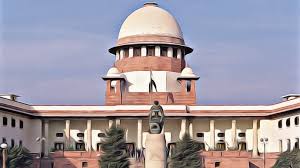A CJI-headed five-judge bench of the Supreme Court while expunging the observations made against the top court by Justice Sehrawat of the Punjab and Haryana High Court, said that discipline of hierarchy should be maintained. A report by Mudit Mathur

A five-judge bench of the Supreme Court headed by Chief Justice D.Y. Chandrachud took suo motu cognizance over widely circulated remarks made by the Punjab and Haryana High Court judge, Justice Rajbir Sehrawat during an online hearing, wherein he passed a detailed order against an earlier Supreme Court order staying contempt proceedings before him. Expunging the remarks, the top court pointed out that “discipline of hierarchy should be maintained”.
Justice Rajbir Sehrawat, in an order passed on July 17, had criticised a top court’s order given on May 3. He had said that the order “turns out to be simply in the nature of putting an estoppel on the powers of the High Court”. There was a tendency on the part of the Supreme Court to presume that it was “more Supreme”, the judge had remarked.
Heading the Bench comprising CJI DY Chandrachud along with Justices Sanjiv Khanna, B R Gavai, Surya Kant and Hrishikesh Roy, said that it was “pained” by the High Court judge’s remarks and said, “The order dated 17 July 2024 is compounded by a video which has been circulating indicating random, gratuitous and unwarranted remarks made by Justice Rajbir Sehrawat during the course of the hearing.”
“In an age where there is widespread reporting of every proceeding which takes place in the Court, particularly in the context of live streaming, which is intended to provide access to justice to citizens, it is all the more necessary that Judges should exercise due restraint and responsibility in the observations which are made in the course of proceedings. Observations of the nature which have proliferated in the video of the proceedings of the Single Judge can cause incalculable harm to the sanctity of the judicial process. We hope and trust that circumspection shall be exercised in the future,” the bench remarked.
“Justice Rajbir Sehrawat has made observations with regard to the Supreme Court of India, which are a matter of grave concern. Judicial discipline in the context of the hierarchical nature of the judicial system is intended to preserve the dignity of all institutions whether at the level of District Court, or High Court or Supreme Court”, the CJI-led bench said in its order.
“This Court is constrained to take suo motu notice of the contents of the order dated 17 July 2024 passed by the Single Judge in view of the fact that such observations tend to bring the entire judicial machinery into disrepute. This affects not only the dignity of this Court but of the high court’s as well. We are accordingly of the view that such observations were wholly unnecessary for the conduct of the judicial proceedings before the High Court and ought to have been eschewed,” the bench ruled.
“Compliance with the orders passed by the Supreme Court is not a matter of choice, but a matter of bounden constitutional obligation, bearing in mind the structure of the Indian legal system and the authority of the Supreme Court which heads the process of judicial adjudication of the country.” “Parties may be aggrieved by an order. Judges are never aggrieved by an order which is passed by a higher constitutional or appellate forum,” the SC orders said.
“We are of the view that in a situation where the authority of this Court is undermined by gratuitous observations made by the single Judge, it is the plain function of this Court to set right any attempt to dislocate the sanctity of judicial authority, and maintenance of judicial discipline. We, accordingly, expunge the observations which have been made by Justice Rajbir Sehrawat in the order dated 17 July 2024 and expect that greater caution should be exercised in the future while dealing with orders of the Supreme Court and, for that matter, the orders passed by the Division Bench of the High Court,” the bench held.













